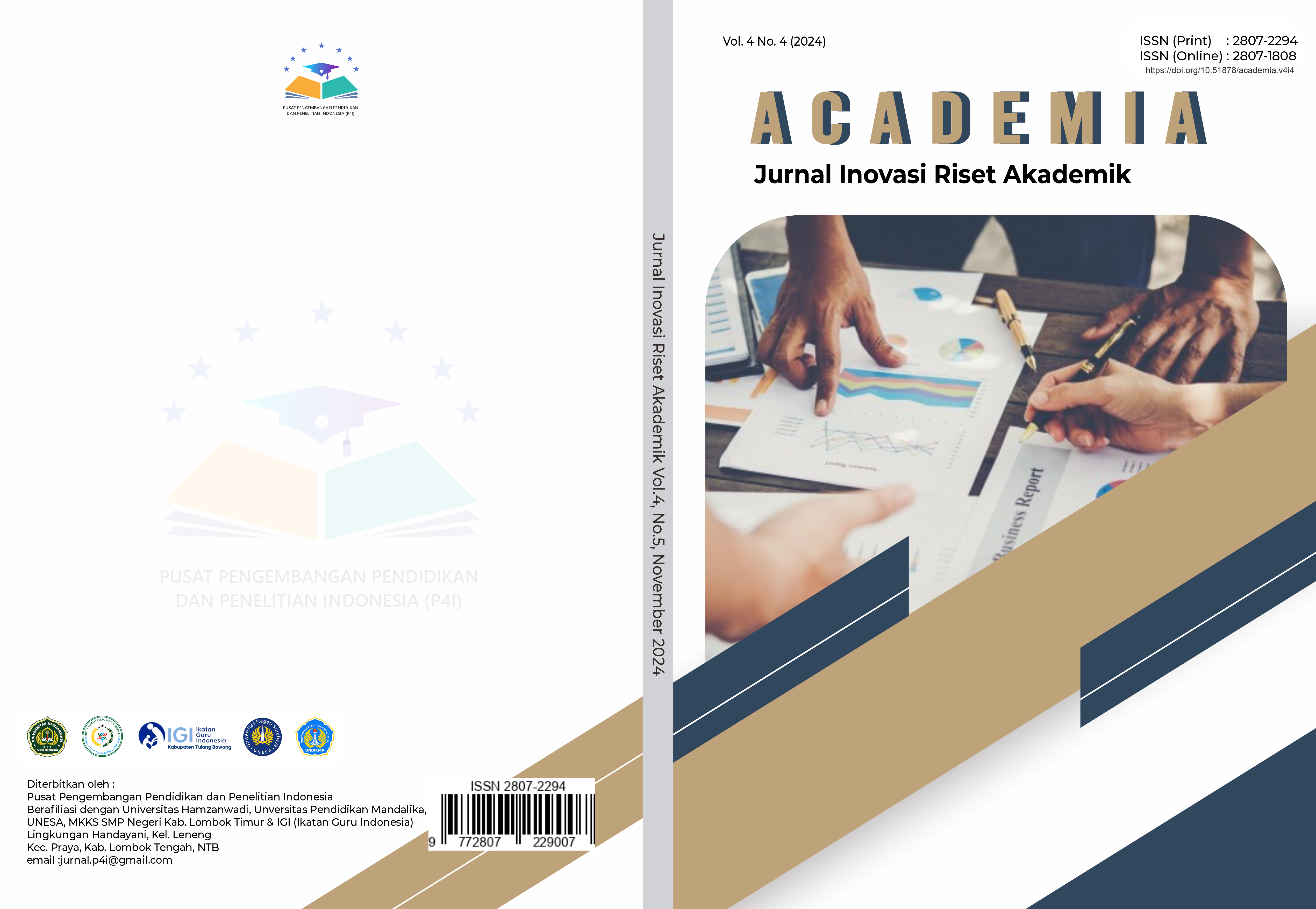WHATSAPP MESSENGER FOR EDUCATION: ATTITUDE, PERCEIVED EASE OF USE AND RETENTION LEVEL AMONG UNDERGRADUATE STUDENTS IN KWARA STATE UNIVERSITIES, NIGERIA
DOI:
https://doi.org/10.51878/academia.v4i4.3671Keywords:
Situs Jejaring Sosial, Media Sosial dalam Pendidikan, WhatsApp Messenger, Sikap, Persepsi Kemudahan Penggunaan dan Tingkat RetensiAbstract
Social media usage for education can never be overemphasized as its rewards are enormous. As one of the integrated social media for education, WhatsApp messenger is an instant message application that runs on smartphone and web-based devices that enables users to trade information via various media form (Sahu, 2019). Many people seem to be awared of WhatsApp messenger and its use. This study therefore investigated the attitude, perceived ease of use and retention level of WhatsApp messenger for education among undergraduate students of Kwara State universities and as well investigated the students’ perceived ease of use of WhatsApp messenger based on school gender. The study revealed that undergraduate students’ attitude towards using WhatsApp messenger for Education in Kwara State universities is positive, the undergraduate students’ perceived ease of use of WhatsApp messenger for education is positive, the undergraduate students’ retention level in using of WhatsApp messenger for education is high, and there is no significant difference in students’ perceived ease of use of WhatsApp messenger for education based on gender.
ABSTRAK
Penggunaan media sosial untuk pendidikan tidak boleh terlalu ditekankan karena manfaatnya sangat besar. Sebagai salah satu media sosial terintegrasi untuk pendidikan, WhatsApp messenger merupakan aplikasi pesan instan yang berjalan pada smartphone dan perangkat berbasis web yang memungkinkan penggunanya bertukar informasi melalui berbagai bentuk media (Sahu, 2019). Banyak orang tampaknya mengetahui WhatsApp messenger dan penggunaannya. Oleh karena itu penelitian ini menyelidiki sikap, persepsi kemudahan penggunaan dan tingkat retensi WhatsApp messenger untuk pendidikan di kalangan mahasiswa S1 Universitas Negeri Kwara dan juga menyelidiki persepsi kemudahan penggunaan WhatsApp messenger oleh siswa berdasarkan gender sekolah. Studi ini mengungkapkan bahwa sikap mahasiswa sarjana terhadap penggunaan WhatsApp messenger untuk Pendidikan di Universitas Negeri Kwara adalah positif, persepsi kemudahan mahasiswa sarjana dalam menggunakan WhatsApp messenger untuk pendidikan adalah positif, tingkat retensi mahasiswa sarjana dalam menggunakan WhatsApp messenger untuk pendidikan tinggi, dan tidak terdapat perbedaan yang signifikan dalam persepsi siswa tentang kemudahan penggunaan WhatsApp messenger untuk pendidikan berdasarkan gender.
Downloads
References
Ahad, A. D., & Lim, S. M. A. (2019). Convenience or nuisance? The ‘WhatsApp’dilemma. Procedia- Social and Behavioral Sciences, 155, 189-196.
Akinlosotu, T. N. (2021). Predictors of WhatsAPP ‘Consumption’ among undergraduate students of Economics in Ambrose Alli University, Ekpoma. An International Multi-disciplinary Journal, Ethiopia, 10(3), 290-301. ISSN 1994-9057 (Print) ISSN 2070-0083 (Online)
Alghamdi, E. A., Rajab, H., & Rashid Shah, S., (2021). Unmonitored students self -created WhatsApp groups in distance learning environments: A collaborative learning tool or cheating technique. International Journal of Research Studies in Educational Technology, 5(2), 71- 82.
Al-Mashaqbeh, I. F. & Al-Mashaqbeh, A. F. (2018). Learning Dialogue through WhatsApp Messenger: Students’ Experience and Attitude. In International Journal Social Science & Education, 8(2), 17-28. ISSN: 2223-4934 E and 2227-393X Print
Alsaleem, B. I. A. (2023). The effect of “Whatsapp” electronic dialogue journaling on improving writing Vocabulary Word Choice and Voice of EFL Undergraduate Saudi Students. Arab World English Journal, 4(3), 213-225.
Atan, A., Azli, N., Rahman, Z., & Idris, R. (2020). Computer in distance self-perceived computer competence. Journal of Educational Media, 3(27), 123-135.
Bryer, T. N., & Zayatamo, S. G. (2021) The effect of newcomer involvement in work related activities: a longitudinal study of socialization. Journal of Applied Psychology, 79, 211–223.
Chipunza, P. R. C. (2013). Using mobile devices to leverage student access to collaboratively- generated resources: A case of WhatsApp instant messaging at a South African University. In International Conference on Advanced Information and Communication Technology for Education ICAICTE.
Devi, T. S., & Tevera, S. (2019). Use of social networking site in the University of Swaziland by the health science students. A Case study in Jounal of Information Management, 1(1), 19-26
Gachago, D., Strydom, S., Hanekom, P., Simons, S., & Walters, S. (2020). Crossing boundaries: lectures' perspectives on the use of WhatsApp to support teaching and learning in higher education. Progression, 37(1), 172-187.
Gasaymeh, A. M. (2022). University Students’ use of Whatsapp and their Perceptions Regarding its Possible Integration into their Education. In Global Journal of Computer Science and Technology: G Interdisciplinary, 17(1), 1-10.
Hargittai, E. (2018). The Digital reproduction of inequality. In D. Grusky (Ed.), Social Stratification. CO: Westview press.
Joicy, A. J. & Sornam, S. A. (2018). Perception of WhatsApp Usage among Students of College of Excellence: A Case Study. In Indian Journal of Information Sources and Services, 8(1), 73-78, ISSN: 2231-6094
Malecela, I. O. (2021). Usage of Whatsapp among Postgraduate Students of Kulliyyah of Education, International Islamic University Malaysia. International Journal of Advanced Engineering Research and Science, 2(5), 1-10.
Ngaleka, A., & Uys, W. (2023). M-learning with whatsapp: A conversation analysis. In International Conference on e-Learning (p. 282). Academic Conferences International Limited.
Ramayah, T., & Osman, M. (2020). Complementing classroom teaching with an internet course website: Does gender and race matter. Proceedings of the 5th South East Asia Association for institutional research conference, September 14th-16th. Westin Resort Nusa Dua, Bali. Indonesia.
Sahu, S. (2019). An Analysis of WhatsApp Forensics in Android Smartphones. In International Journal of Engineering Research, 3(5), 349-350.
So, S. (2021). Mobile instant messaging support for teaching and learning in higher education. The Internet and Higher Education, 31, 32-42.
Tang, Y., & Hew, K. F. (2022). Is mobile instant messaging (MIM) useful in education? Examining its technological, pedagogical, and social affordances. Educational Research Review. Retrieved from http://www.science direct.com/science/article/pii /S0747563216305039
Tarighat, S., & Khodabakhsh, S. (2021). Mobile- Assisted Language Assessment: Assessing speaking. Computers in Human Behavior, 64, 409- 413.
Wolfgang, R., Christian, M., Peter, B. S., & Hendrik, D. (2020). Understanding the meaning of awareness in Research Networks. Retrieved from http://ceur-ws.org/Vol-931/paper1.pdf
Downloads
Published
How to Cite
Issue
Section
License
Copyright (c) 2024 AFEEZ ABIOLA HAMZAT, ADESHINA COKER

This work is licensed under a Creative Commons Attribution-NonCommercial-ShareAlike 4.0 International License.















